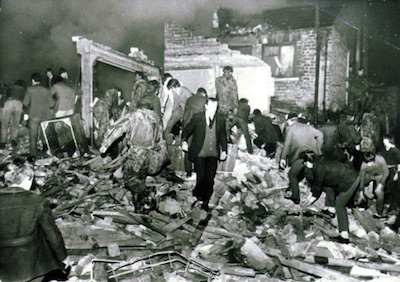
The PSNI has been forced to accept a finding that the original police investigation into the McGurk’s Bar bombing was biased.
The development has been cautiously welcomed by the families of those bereaved, as a step towards uncovering the truth in the murky history of the loyalist atrocity and the British state’s ‘dirty war’.
The north Belfast pub was blown up in a massacre by unionist paramilitaries in December 1971, killing 15 people -- and in an apparent propaganda manoeuvre, the attack was immediately characterised by state forces as an IRA ‘own goal’.
Four years ago, a Police Ombudsman investigation identified investigative bias in how the RUC police handled the case. It concluded that the RUC failed to properly investigate UVF responsibility for the bombing.
As a result relatives of those killed mounted a legal action.
A separate review subsequently carried out by the now defunct Historical Enquiries Team (HET) reached a different verdict. Extraordinarily, it claimed there was no evidence of any bias on the part of the then RUC police.
Those findings were challenged by Brigid Irvine, whose mother, Kathleen, was among those killed in the attack. Her legal team sought a judicial review in a bid to have the HET report quashed, arguing that its conclusions were irrational.
Lawyers for the PSNI said in court on Friday they now accepted the Police Ombudsman’s original findings.
TRUTH PURSUED
Although Ms Irvine did not attend the hearing, her sister, Pat, welcomed Mr Hamilton’s decision.
“It makes you wonder what exactly has made him come to his conclusion that didn’t make (previous PSNI chief Matt Baggott) come to the same conclusion,” she said.
She said the families had been fighting for 44 years to find out the full circumstances surrounding the bombing.
“All we have ever asked for is the truth, and we will continue to ask for it until we get it,” she said.
Proceedings were adjourned to next month, when a final resolution to the case is expected.
Campaigners have said the families want the findings that the RUC did nothing wrong to be formally overturned. They believe that the PSNI has been forced to reverse its position only because of a strong legal threat.
Researcher and author Ciaran Mac Airt said the PSNI, faced with discovery requests for logbooks dating from 1971, had “buckled” in order to prevent the release of information proving the RUC had advanced the republican ‘own goal’ idea from the outset.
“The organisation... is simply following standard British policy for these legacy cases - delay as long as possible and hope that the families will die and go away.”
He said the history of the PSNI had proved that it is not an independent player in thousands of legacy cases and is “inextricably linked” with that of its predecessor, the RUC.
“At best, the PSNI’s role in legacy cases is delay, obfuscation and intransigence. At worst, it is a criminal enterprise, carrying on with the dirty work of the RUC - collusion and cover-up.
“Perverting the course of justice in legacy cases is the PSNI’s stock-in-trade.”
LOUGHGALL
Meanwhile, the British government has said it will not block inquests into an ambush by the British Army’s SAS, in which eight IRA men and a civilian were shot dead almost 30 years ago.
The IRA Volunteers killed at Loughgall in County Tyrone were Jim Lynagh, Patrick Kelly and Padraig McKearney, Gerard O’Callaghan, Tony Gormley, Eugene Kelly, Seamus Donnelly, and Declan Arthurs. Civilian Anthony Hughes was killed after being caught up in the gunfire.
It is uncertain when the new inquests will get under way as the Coroners’ Service is already struggling to deal with a backlog of legacy-related cases.
Mairead Kelly, whose brother Patrick Kelly was one of those shot dead, welcomed the decision which followed an examination of “national security” implications by the British Advocate-General.
Leave had been granted for a judicial review of the process by which the matter was taken out of the hands of the Six County Attorney General John Larkin.
“It is a decision that should have been taken here in northern Ireland and not in London and not by a British politician,” she said.
“We hope that the inquests can be established promptly and that the families of the victims and the coroner are provided with all the information they need. We are a step further toward the truth, justice and accountability we seek on behalf of our loved ones.”
![[Irish Republican News]](https://republican-news.org/graphics/title_gifs/rn.gif)
![[Irish Republican News]](https://republican-news.org/graphics/title_gifs/harp.gif)

